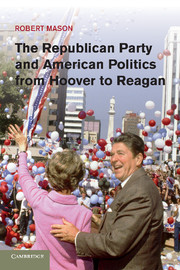Book contents
- Frontmatter
- Contents
- Acknowledgments
- Introduction
- 1 “From Old Home Melodies to Jazz Music”: 1928–1933
- 2 “As Maine Goes, So Goes Vermont”: 1933–1939
- 3 “The Simple Barefoot Wall Street Lawyer”: 1939–1945
- 4 “Liberty versus Socialism”: 1945–1953
- 5 “Modern Republicanism”: 1953–1961
- 6 “A Choice, Not an Echo”: 1960–1968
- 7 “There’s a Realignment Going On”: 1968–1976
- 8 “You Are Witnessing the Great Realignment”: 1977–1989
- Conclusion
- Archival Sources
- Index
- References
4 - “Liberty versus Socialism”: 1945–1953
Published online by Cambridge University Press: 05 December 2011
- Frontmatter
- Contents
- Acknowledgments
- Introduction
- 1 “From Old Home Melodies to Jazz Music”: 1928–1933
- 2 “As Maine Goes, So Goes Vermont”: 1933–1939
- 3 “The Simple Barefoot Wall Street Lawyer”: 1939–1945
- 4 “Liberty versus Socialism”: 1945–1953
- 5 “Modern Republicanism”: 1953–1961
- 6 “A Choice, Not an Echo”: 1960–1968
- 7 “There’s a Realignment Going On”: 1968–1976
- 8 “You Are Witnessing the Great Realignment”: 1977–1989
- Conclusion
- Archival Sources
- Index
- References
Summary
Both pessimism and optimism characterized the GOP outlook on peace’s return. On the one hand, the Democrats’ policy ambitions kindled Republican pessimism. Many in the party had a dark view of the liberal agenda that Harry S. Truman pursued as president; Truman assumed the presidency on Franklin Roosevelt’s death in April 1945, not long before the end of World War II in Europe. According to Senator Robert A. Taft, writing in 1949, “the Truman program contains a series of police-state measures to attain Utopia, which, taken together, would completely destroy liberty in the United States, impair justice and equality and subject every American family to the dictates of an all-powerful state.” On the other hand, a climate of electoral optimism accompanied the gloom-laden policy outlook. This optimism reflected the belief that the administration’s pursuit of what Truman called the “Fair Deal” was sure to alienate a majority of Americans; its return to the concerns of New Deal liberalism encouraged many Republicans to conclude that their victory was certain. In 1950, Republican politicians made the point explicit by adopting the theme of “liberty versus socialism” for their midterm campaign.
Republican confidence was misplaced, however. The party did make gains during this period, but not because of a generalized turn away from New Deal liberalism. In 1946, the problems of postwar reconversion created discontent with the incumbent Democrats. The subsequent success of the early 1950s was thanks to the arrival of fresh concerns that targeted different dissatisfactions with the in-party, summarized in 1952 as “Korea, Communism, and Corruption.” It was thanks, too, to the arrival of a newcomer to electoral politics as the Republicans’ presidential candidate, Dwight D. Eisenhower, who restored the party at last to the White House.
- Type
- Chapter
- Information
- The Republican Party and American Politics from Hoover to Reagan , pp. 112 - 147Publisher: Cambridge University PressPrint publication year: 2011



